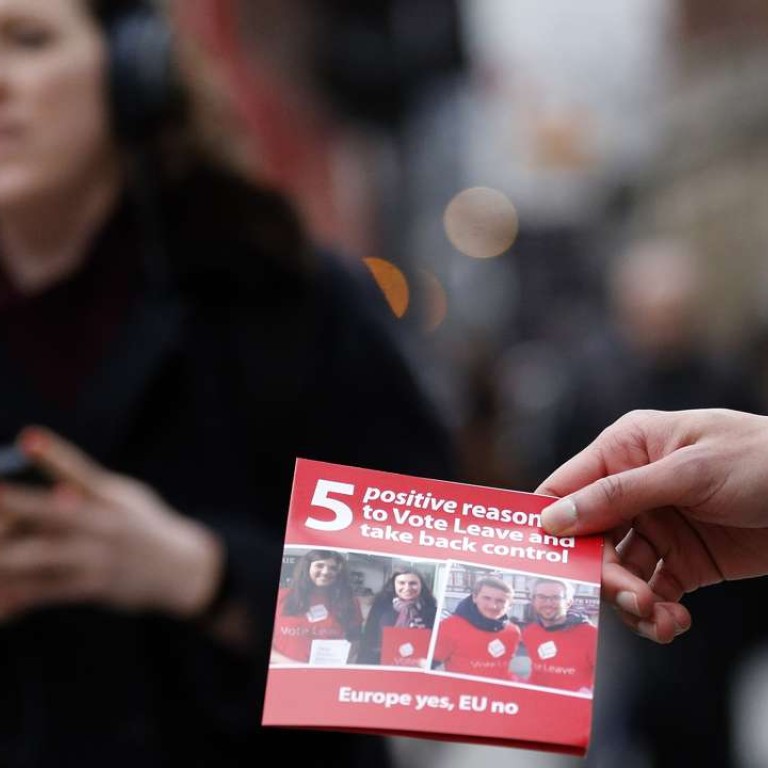
Why little Britain’s parochial Brexit debate is totally underwhelming
Andrew Collinson says both sides of the stay-or-go campaign are good at appealing to populist sentiments but are sadly bereft of a vision for Britain’s role in Europe and the world
Six thousand miles away from London’s Houses of Parliament, the debate over the UK’s upcoming referendum on its membership of the European Union looks even more negative and parochial than it does on British soil. Advocates of Britain remaining a member of the EU prophesize an economic apocalypse should the public vote to leave in June. “Brexit” supporters issue dire warnings of open borders and a tsunami of immigrants and, provocatively, a greater risk of terrorism if the public votes to stay. Conspicuously absent from both campaigns is any appeal to European solidarity or more than a passing acknowledgement of geopolitical challenges elsewhere in the world. While the Middle East burns, China’s economy teeters, and Europe faces an unprecedented migrant crisis, the UK is having a conversation with itself. Britain’s Splendid Isolation at the dawn of the 20th century has been replaced in the 21st century with Solipsistic Isolation.
Whatever the vote, Britain’s Brexit poll is a scary proposition
The British have always been ambivalent about their relationship with their continental cousins, and waxing lyrically about the European project’s founding aims would be scoffed at by many voters. But politicians from the Labour and Conservative parties have allowed apathy on the part of voters to fester into animosity by failing to challenge tabloid-propagated anti-EU myopia. The global recession of 2008 turned a manageable Euroscepticism into a noxious Europhobia, where Britain’s woes – real or imagined – could be blamed on Brussels bureaucrats. The consequences of this climate of cynicism is evident during this referendum campaign. With support for far-right politicians rising across much of Europe, it is pitiable that the prime minister of the world’s oldest democracy sees no electoral benefit in lauding the EU and its original inception, the European Coal and Steel Community, for being an effective bulwark against fascism and communism.

Backers of Brexit should consider its devastating consequences on global peace and security
Contrary to what David Cameron would have everyone believe, the “in or out of Europe” referendum was never gifted to the British public as an exercise in democracy. The prime minister, sagging in the polls in 2013 and two years away from what was expected to be a closely fought re-election battle, was kowtowing to the demands of Eurosceptic members in his own Conservative Party. Eschewing lofty ideals of European solidarity, Cameron cloaks his support for remaining in the EU by touting assurances that monetary benefits to European migrants living in Britain will be restricted, and that the cost of flying to Europe for holidays will increase should Brexit occur. Brexit groups, lacking a convincing economic rationale for why the public should vote to leave the world’s largest free trade bloc, pander to nationalist sentiments by peddling fantastical tales of an undemocratic European parliament on a crusade to usurp British sovereignty.
While the Middle East burns, China’s economy teeters, and Europe faces an unprecedented migrant crisis, the UK is having a conversation with itself
Devoid of an inclusive, forward-looking message for Britain in Europe – whether the country remains a member of the EU or not – prominent figures from the two opposing campaigns have dredged up correspondence from former prime minister Margaret Thatcher in a desperate attempt to support their agendas. It is a damning indictment of the intellectual vacuity on both sides of the referendum campaign that contemporary political figures are addressing perhaps the most definitive British domestic and foreign policy question in a generation by rifling through the letters of a deceased prime minister who left office over 25 years ago. Thatcher is a poltergeist tormentor to both sides of the referendum debate. The men and women who claim to revere her would be well judged to exorcise their obsession and focus on the present.
If Britain’s decades-long melodrama over its relationship with Europe is operatic – long, complex and punctuated with memorable soliloquies – this year’s duo of dumbed-down referendum campaigns are more akin to the Eurovision song contest. Behind the smokescreen of two provincial campaigns bereft of introspection, observers outside of the UK see a political elite agonisingly unsure of their country’s future role in Europe and the world. So unsure, in fact, that they willingly surrendered the fate of the UK’s membership of the EU to voters at the ballot box.
Andrew Collinson is a British writer based in Hong Kong
